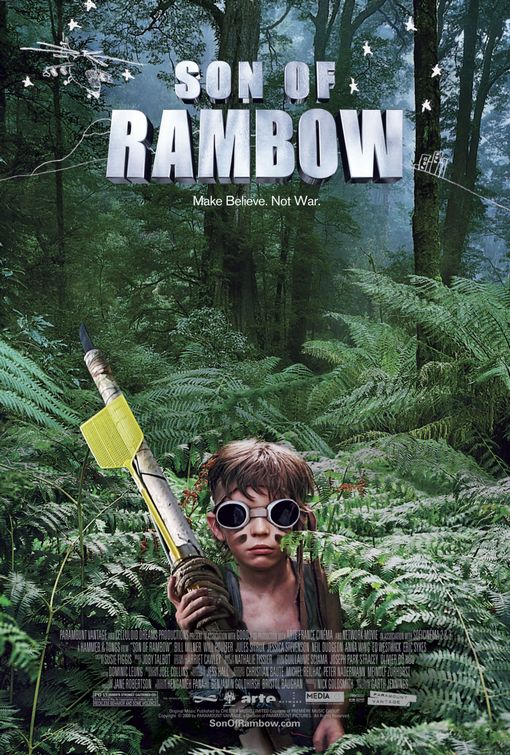
Main Page
Interviews Menu
Alphabetical Menu
Chronological Menu


Garth Jennings writes and directs Son of Rambow, a British dramedy set in the 1980s, Will (Bill Milner) and Carter (Will Poulter), two young kids obsessed with Rambo: First Blood, remake their own version of the movie, calling it Son of Rambow. Meanwhile, Didier (Jules Sitruk), a French foreign exhange student with a unique sense of fashion, attacts attention to himself and threatens their own reputation as kids and as amateur filmmakers. Garth Jennings has previously directed The Hitchhiker's Guide to the Galaxy with producer Nick Goldsmith, who also serves as a producer on Son of Rambow. Garth and Nick both work together on their production company, Hammer & Tongs. This marks Garth Jenning's directorial debut. I had the privilege to interview both Garth and Nick together. Paramount Vantage releases Son of Rambow on May 2nd, 2008. NYC MOVIE GURU: How did you come up with the idea to make Son of Rambow? GJ: This whole film started from the fact that I was about 12, I saw First Blood with my friends. It was the first film I saw that wasnít meant for my age group and I just thought it was amazing. We all did. We just thought it was incredibleóa guy with just a stick and a knife and he takes on 200 men. He only killed guy with a rock that fell out through a helicopter and it was his own fault. It was very exciting when youíre 12 to see somebody against the system, being resourceful, and outsmarting the enemy with his own brain and survival techniques. I was so excited about it that I then made my own little action movie using my dadís video camera. It was a Ramboesque set in my parentís backyard. I then made lots of other films, but I was talking to Nick [Goldsmith] about them eight years ago. I realized that it captures something we really liked about being kids. We just trying to make a film that captured how we remembered childhood beingó[the freedom] of being able to do things without screwing up. [We didnít] want to be a slave to the reality of it, [though]. It was hard to capture the effect that Rambo had on us by copying my own experiences. [So], we tried to capture how my childhood felt without worrying about capturing the reality of what that was like. NG: We learned a good lesson doing it that way which was that thatís not the best way of doing it. We started off just with a feeling rather than a plot. There were four or five completely different films before we got to this one that we ended up writing. Because youíre starting just with a feeling, you donít know where youíre going. When we first started, it was much more autobiographical. Garth [Jennings] and I have very happy upbringing, [but] it doesnít make for a good story. So, a big lesson for us was [to have a] plot. NYC MOVIE GURU: What was the greatest challenge for you? GJ: One of problems with the film is that itís very hard to sum up. People are going, ďSon of Rambow!?!?! I donít want to see his son!Ē or whether or not itís a comedy. Weíve tried to make it something that everyone can enjoy. Thatís the problem: marketing to everybody. NYC MOVIE GURU: How did you come up with the humor in the film? NG: Itís more situational comedy rather than funny lines. That comes from all our work in music videos, which was part of our film school training. If youíre trying to create humor within a soundtrack, itís got to come from a visual of the situations. For us, itís definitely along those lines than writing incredibly funny [dialogue]. NYC MOVIE GURU: How do you see the difference between British and American humor? GJ: I certainly donít have a preference where it comes from because both countries are capable of both good and bad. NG: We donít come at it to write something which is British humor. When we set out to make this, we wanted to make a filmónot a British [or] American film. Itís very much like when youíre a kid and you see Rambo for the first time, youíre not like, ďOh, look! Thereís an American hero. Iím going to be like that American guy.Ē [Heís] just a hero. Thatís how we approach comedy. Some of my favorite comedies are American and some of them are British. GJ: A lot of jokes donít translate well around a water cooler. All of the jokes work within the context of the film and the characters. Once you get to know the world and the people [within the film], then it starts to become funny. NYC MOVIE GURU: How do American audiences respond to the film differently than British audiences? GJ: American audiences are more vocal about how theyíre feeling. The same kind of feeling at the very end is felt by both audiences, but all the way along you hear it more in American audiences than in the UK. We tend to be a more reserved nation, I suppose. GJ: We love the silent, visual comedy. NYC MOVIE GURU: How did you end up choosing the two young actors, Bill Milner and Will Poulter? GJ: It took five months to find them. They brought a charm to it and actually became great friends doing it. Also, they never became self-conscious. All they were doing was just having a blast pretending to be movie stars and being kids, which they did very naturally. If people do like the film, itís because they really engage with those two kids. NYC MOVIE GURU: Did they do all they own stunts? GJ: We had stuntmen who were doing all the dangerous stuff, but the boys would have done it if they could. NYC MOVIE GURU: What scenes did you end up cutting? GJ: Weíve always been real planners, so we figured that with the limited time we had with the children and the budget, we had to get this dead right. So, it came out as we wanted to and there was no waste at all. NYC MOVIE GURU: What films would you like to reenact? GJ: I donít want to reenact anything. Even when we made our own action movies, it wasnít Rambo. It was our own charactersówe called it Aaron: Part I. I always liked the idea of creating your own thing. NYC MOVIE GURU: Why did you include the line about the misspelled title all the way after the end credits roll? GJ: Because if we put it into the film, it would have felt like a cheat. There was no way that we could have put that in that would have been a natural conversation to have had. Having left the cinema and seeing the film, you can imagine him saying that. [Also], I didnít feel it was that important. Main Page Interviews Menu Alphabetical Menu Chronological Menu ______________________________________________________ |
The NYC Movie Guru
themovieguru101@yahoo.com
Privacy Policy